Program Overview
Spend 4 weeks immersing yourself in a study abroad program that goes beyond sitting in an air-conditioned classroom. Soak up the summer sun in one of the world’s most enchanting cities, not to mention the world-famous nightlife… sound pretty good? Welcome to Barcelona.
Barcelona is often known as the cultural hub of the Mediterranean and there are a million reasons why. When you think of Barcelona, often the first things that spring to mind are tapas and sangria. Don’t get us wrong, food plays an integral part of this experience but Barcelona has so much more to offer than just trendy tapas bars.
Summer (July) in Europe is the perfect time to visit. Enjoy one of Barcelona’s famed beaches and join the locals in a game of beach volleyball, or just take in the views. Make the most of your time in Barcelona by catching a Flamenco show, taking a cooking class and visiting local markets.
Barcelona also boasts more World Heritage listed sites than any other city in Europe. Culture vultures will go gaga over the amazing architecture, some of which is 2,000+ years old. There are a ton of museums, churches, cathedrals, concert halls and of course the modern art of famed artisans like Joan Miro and Pablo Picasso. During your cultural discovery you’re guaranteed to see the influential architecture of Antoni Gaudí. His work is easy to spot around the city – just keep a look out for whimsical and playful architecture that you’d expect to find in a Dr Seuss storybook.
Highlights
This July in Barcelona program is one of the best on offer! It is dynamic and unique and will no doubt leave a lasting impression. Don’t just take our word for it! Check out some of the key highlights below and then see it all for yourself:
- You’ll be given a personal orientation upon arrival
- Guided tours of the amazing city of Barcelona are on offer
- The program attracts a range of students from all over the world, so there are plenty of opportunities to make new friends
- Immerse yourself in a truly Spanish experience by taking part in a Spanish and Catalan cooking class
- Catch a Flamenco show (or take a lesson or two), visit museums, galleries and parks and enjoy cinema nights with your fellow students
- The July in Barcelona program includes a one-day excursion. Past activities have included to Figueres to visit the impressive Dalí museum, and to Tarragona, the ancient Roman capital on the Iberian Peninsula.
Choose Your Course
The unique curriculum offered on this program is hosted at Barcelona School for International Studies (SIS). Students take 1 course worth 3 US credits. The program also offers plenty of opportunities to immerse yourself in the local culture, meet Spanish and other international friends and study with students from all over the world.
2025 Course Offerings:
- Elementary Spanish Language and Culture
- Food and Culture in the Mediterranean Basin
- International Marketing
Course Load: 1 course, equivalent to 3 US credits / 45 contact hours
- Depending on your Australian university, “courses” may be referred to as “subjects” or “units”.
- Each course/subject/unit you undertake on a CISaustralia program is designed to be a full-time, semester course that has been condensed to fit into an intensive, short-term program. As such, for any 1 course you study abroad, you should receive the credit points for 1 full-time course/subject/unit at your Australian university.
- Many universities work off of a 1-for-1 equivalency (1 course abroad = 1 course in Australia), but ultimately credit approval is the decision of your faculty and Australian university.
- CISaustralia strongly recommends that you have any overseas courses pre-approved for academic credit before you depart for your program. Some documentation that may be useful are the course outline/syllabus, program overview and the contact hours.
- Before you head overseas we encourage all students to have at least 2 courses approved from your home university in Australia. This will allow some flexibility in your class schedule. Studying overseas is also an opportunity to take some interesting electives if your degree allows.
- Please be aware that the courses listed below are subject to change and cannot be guaranteed year on year.
- Your CISaustralia Program Advisor can assist with any questions or details your university needs to make a decision.
How to Choose Your Courses: This is the fun part. As part of the application process you will be required to complete a CISaustralia Course Selection Worksheet. See below for more information about the courses on offer.
Academic Requirement: To qualify for this program, students must be in good academic standing with a GPA of 4.5 (out of 7) or equivalent. If your current GPA falls below the requirement, you may still be considered for the program but will need to be prepared to provide supporting documentation. Please contact us to discuss your situation and we will work with you to help find another suitable program if required.
NOTE: Please be advised that the Barcelona School for International Studies requires a student’s official transcript when considering applicants for their Summer School. Ordering an official transcript from a university can take up to a few weeks. Students applying near or on the program’s application deadline should plan to have their official transcript on hand.
2025 Course Descriptions:
This course will examine various aspects of the relationship between food, culture and society in the Mediterranean basin, where eating is not a simple act of survival but rather a cultural and social activity. Looking at the local culture through the lens of food allows us to discover and understand social constructs, values and even the history of Europe, from ancient Greece to the great chefs of the 21st century such as Ferran Adrià. Through this we will discover the similarities and differences between how the Spanish, Italian and Greece societies work.
In this course we offer a cross-cultural perspective that will focus on history, anthropology, sociology, literature, gastronomy and the business that works behind the food industry.
International marketing is more than a simple application of marketing principles to more than one country. In a world that becomes increasingly globalised, marketing strategies become absolutely essential. Both global and international marketing are attached to each other. On one hand, international marketing involves the firm in making one or more marketing mix decisions across national boundaries. On the other hand, global marketing involves the firm in establishing manufacturing facilities overseas and coordinating marketing strategies across the globe. Cross-cultural differences have an important role in both internal and external ways.
This course provides the knowledge of the fundamental concepts of international marketing from a European perspective. It is organised so that each class is either a lecture or a case discussion. In this course you will learn to look at international marketing problems through the lens of an analytical framework.
After completion of this course, the student will be able to:
- Produce simple sentences
- Ask and answer questions about him/herself, about others, and about things s/he has or needs
- Produce simple statements concerning his/her needs or usual subjects and to answer questions of this type when they are directed to him/her
- Use culturally appropriate non-verbal communication
This course will examine various aspects of the relationship between food, culture and society in the Mediterranean basin, where eating is not a simple act of survival but rather a cultural and social activity. Looking at the local culture through the lens of food allows us to discover and understand social constructs, values and even the history of Europe, from ancient Greece to the great chefs of the 21st century such as Ferran Adrià. Through this we will discover the similarities and differences between how the Spanish, Italian and Greece societies work.
In this course we offer a cross-cultural perspective that will focus on history, anthropology, sociology, literature, gastronomy and the business that works behind the food industry.
This course will examine various aspects of the relationship between food, culture and society in the Mediterranean basin, where eating is not a simple act of survival but rather a cultural and social activity. Looking at the local culture through the lens of food allows us to discover and understand social constructs, values and even the history of Europe, from ancient Greece to the great chefs of the 21st century such as Ferran Adrià. Through this we will discover the similarities and differences between how the Spanish, Italian and Greece societies work.
In this course we offer a cross-cultural perspective that will focus on history, anthropology, sociology, literature, gastronomy and the business that works behind the food industry.
COVID Safe Travel
The health and safety of our students is our highest priority. We take our duty of care for our students, their families and our Australian University partners seriously. For all of our program locations, we have developed a site-specific COVID-19 risk matrix and risk management and emergency response plans so that health and safety response protocols are monitored, managed and communicated.
In preparation for your overseas program, it’s important that you carefully read and understand information related to COVID-19 Travel Safety and Insurance Requirements.
CISaustralia monitors Smartraveller and reliable news feeds to keep up to date with the latest COVID information and any associated travel restrictions and entry requirements for all destinations where we have programs. Due to the constantly evolving COVID-19 situation, Government travel advice can change quickly. For the most up to date information on Spain, visit the Smartraveller website.
Excursions
We’ve said it before and we’ll say it again – Barcelona is one of the very best study abroad destinations and you will absolutely love this short course program.
Our staff in Barcelona organise a fantastic social program that covers a lot of ground for the short time that students are there for. Activities change from year to year, but in the past students have attended cooking classes, taken a tour of Sagrada Família, learnt how to do some traditional dancing and gone for hikes. No matter what our team has planned, you’re sure to have an amazing cultural experience!
You also have the freedom to explore Barcelona and its surrounding areas by yourself. Finding activities doesn’t have to cost money. Spend your afternoons hanging with the locals at the beach. Sunbake on squeaky clean white sandy beaches, relax in the sun and enjoy the warm Mediterranean waters. On the first Sunday of every month, the city opens its doors to all municipal museums free of charge.
Our fabulous staff will become your best travel guides – they will look to take you to the Spanish cinema, a Flamenco show, the museums and markets. They can also help you arrange a language exchange partner and a Catalan cooking class.
If you want to travel a bit further afield, take advantage of a weekend and travel. There are a few destinations to choose from including Costa Brava, Granada and Madrid. Even if you decide not to take part in the planned cultural events and excursions, our friendly staff will still be there for you to offer advice, answer questions and help you every step of the way. All you have to do is ask.
Location
Located on the shores of the Mediterranean it’s no wonder that Barcelona is one of the very best study abroad destinations. With a perfectly comfortable year-round climate, summer dresses, shorts and sandals will be your daily attire. Ahhh Barcelona, land of eternal sunshine.
Barcelona is on the northeast coast of the Iberian Peninsula (which includes Spain and Portugal) and on the shores of the stunning Mediterranean. With a population of 1.5 million, it is Spain’s second largest city and one of the central hubs for business in Europe. If you include the outer lying areas surrounding Barcelona, the population expands to almost 5 million, adding to the diversity of the city and its people.
Barcelona is located in the semi-autonomous Spanish region of Cataluña and has two official languages: Castilian Spanish and Catalan. English is very commonly spoken, especially by servers and other hospitality staff, as Barcelona considers itself as much European as Spanish to certain extents and hosts millions of tourists each year.
Getting around is a breeze – a fantastic public transport system makes all the great places and beaches Barcelona has to offer easy to visit. It also gives you easy access to the campus and all the amazing sites located throughout the city. But by far, the very best way to see Barcelona is on two wheels. Vast networks of bicycle paths weave in and around the city so grab yourself a pushie and go exploring. When you need a rest, stop at a local cantina for a cool drink and when the belly starts to grumble pull into a tapas bar and indulge your senses in a fresh and colourful feast.
Barcelona is world class when it comes to culture, including art, cuisine and traditions unique to this wonderful city. From the Spanish tradition of tapas to frequent festivals, human pyramids called castellers, and a naturally healthy appetite for food, drink and social company, Barcelona pulsates with life. Like many major cities, Barcelona has dozens of distinct neighbourhoods, but the difference is substantial – some of the city’s neighbourhoods are millenia- or centuries-old, and others just years. Simply strolling the city streets is an experience in itself, as architecture, layout, demographics and locales change from street-to-street.
Barcelona is such a truly diverse city, it boats a largely international population and is alive with colour and flare. The people are the pulsing heart of the city and you’ll find yourself being welcomed – it doesn’t take too long to feel like you are ‘home’ in Barcelona. There’s also the eclectic nightlife, an abundance of significant historical attractions and welcoming and friendly locals. Barcelona is a rich cultural tapestry with history that weaves through the city. It truly is an unparalleled place to study abroad. See you in Barcelona this July!
The University
As a student you’ll be studying at Barcelona School for International Studies (SIS) located in the heart of the city. SIS offers the best local and international professors while maintaining small class sizes. Individualized attention, ongoing evaluation, group projects, and a curriculum closely tied to the city set this university apart. Each course includes a variety of field studies and guided reflection. SIS is a Spanish institution with U.S. accreditation through Jacksonville University in Jacksonville, Florida.
Accommodation
Students are usually allocated double rooms on this program sharing with another student of the same gender. If students would prefer a single room, they can choose to pay a single supplement fee (please see below ‘Program Fee and Dates’ for more information on the single room supplement).
Housing for the program is spread throughout the city of Barcelona. Every neighbourhood is easily accessible by public transportation and the city is very walkable. The normal commute in Barcelona is around 45 minutes using public transportation from your housing to your classes, though it may vary slightly.
Each neighborhood offers a different vibe. Les Corts is home to the soccer stadium. Gracia boasts a hipster, bohemian vibe. Eixample features stunning architecture and a vibrant LGBTQ+ district. Sagrada Familia offers excellent shopping. Sant Martí and Poblenou are tech hubs away from the usual tourist trails.
You will need to make adjustments to what you are used to in Australia. This is part of your cultural immersion. Living conditions and expectations are different in every country in the world. Be flexible, patient and understanding.
Residence Hall
There are three residence halls available, located in neighbourhoods across the city all within a 45-minute commute to campus. The halls are co-ed, but rooms are same-gender. Each room comes fully furnished, including towels, bed linen and its own ensuite. Most locals live with their parents while they go to university, so dormitories are rare, but there are a few set up to house international students or those that come from outside the city. Being hosted in a Residence Hall means you will be sharing your space with other students from a wide variety of nationalities. All residence halls have a shared kitchen and provide cooking utensils. All residence halls have 24-hour security, common areas and laundry facilities.
Shared Apartment
This choice places you in a shared apartment in the city with 2-6 other program participants. Most apartments have double rooms, so you will be sharing a room with another student. Single rooms may be available for an additional cost. Apartments are spread throughout the city in residential areas so you can expect a 45-minute commute to classes. You will find that the outside facades of some buildings are very old – many of them are 19th century and do not have elevators. The available storage and living spaces will be smaller than most Australians are accustomed to, and you may find that many places do not have air conditioning or dryers. Such amenities are treated as a luxury in Spain, and are expensive to operate. Living in an apartment gives you the opportunity to live locally and explore the city independently.
If you wish to really ‘live local’ and improve your Spanish – please ask your advisor about homestay options available in Barcelona.
Please note: Students are liable to pay for any damages that occur to the accommodation. Replacing lost/stolen/damaged room keys and/or other damages that happen onsite will be charged directly to the student (in local currency).
Residence Hall:
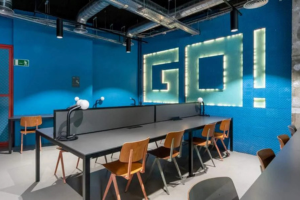
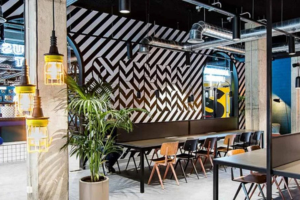
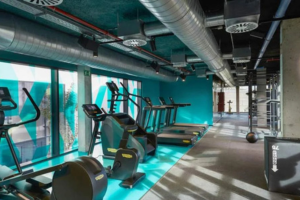
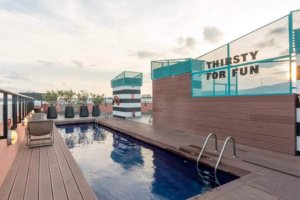
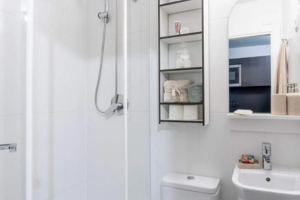
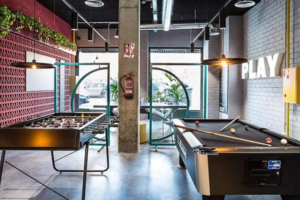
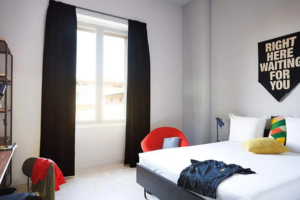
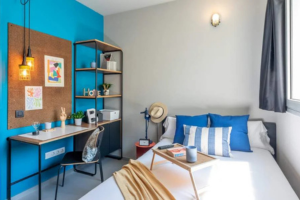
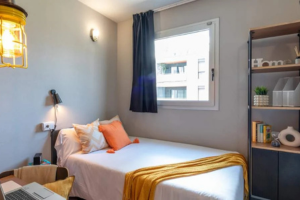
Shared Apartment:
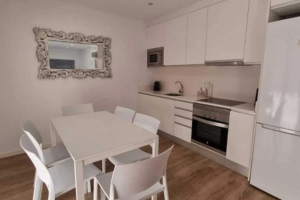
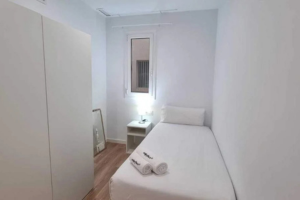
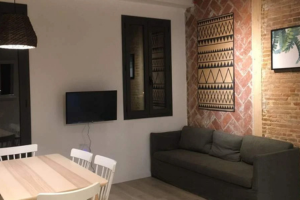
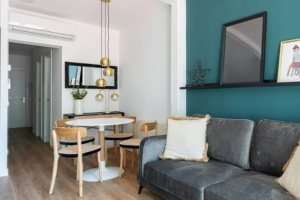
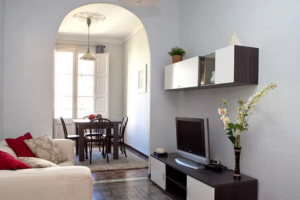
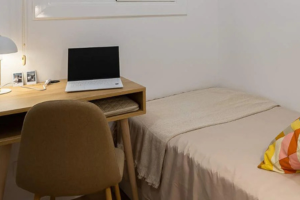
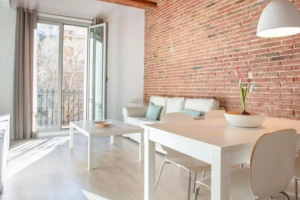
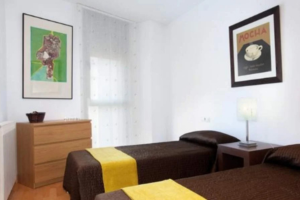
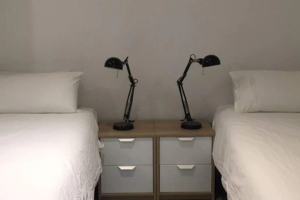
Program Fee & Dates
| July 2025 | |
|---|---|
| Application Deadline | 28 April 2025 |
| Arrival Date | 01 July 2025 |
| Departure Date | 26 July 2025 |
| Application Fee | A$ 99 |
| Program Fee | A$ 6,999 |
| OS-HELP | A$ 8,245 |
Program fees include the following:
- CISaustralia support services before, during and after the program
- Academic advising
- Financial advice
- Assistance with travel arrangements
- Pre-departure guide and session
- Airport welcome service (on specified program arrival date within designated arrival times)
- Accommodation – shared or single room in a student residence hall or shared apartment*
- Breakfast and dinner daily are included with homestay accommodation
- Tuition fees
- Cultural and recreational trips and activities in Barcelona
- One guided day excursion
- Program risk matrix and COVID-19 risk assessment
- Risk Management and Emergency Response Plan
- CISaustralia 24/7 on-site support – Site Director
- Jacksonville University official transcript**
- CISaustralia Certificate of Participation (available on request)
*Single rooms may be available for an additional fee. Please contact your CISaustralia Program Advisor if you wish to arrange a single room. Most student accommodation (residence hall, shared apartment or homestay) is in double rooms with same-gender (biological sex) students. You can pay a single room supplement, but availability is first-come, first-served and not guaranteed. However, 95% of students who pay the single supplement receive a single room. If we are unable to assign you to a single room, we will refund you the additional fee paid. Please be aware that there is a chance that other students will also get single rooms even without paying the extra fee by the luck of the draw and pending allocations available (similar to if you pay to get a window seat on a plane and others who didn’t pay also get one).
**Jacksonville University will provide an official transcript as the School of Record (SOR). An SOR is a U.S. accredited institution of higher education that officially documents and awards credits for programs or institutions that are not accredited in the U.S., verifying appropriately all elements necessary for such official documentation.
Please be advised that the Barcelona School for International Studies requires a student’s official transcript when considering applicants. Ordering an official transcript from a university can take up to a few weeks. Students applying near or on the program’s application deadline should plan to have their official transcript on hand.
What is not included:
- Program application fee
- International Student Identity Card
- Flights (CISaustralia will however provide travel guidance and support via our formal travel partner)
- Medical insurance
- Travel insurance
- Visa fees
- Vaccinations (if required)
- Airport transfer fees*
- Meals (unless mentioned above)
- Extra travel/excursions (other than those mentioned above)
*The cost of airport transfer, via taxi, from Barcelona airport to your accommodation will be approx. €35 one way. Students might have the opportunity to share a taxi (and split costs) with other students if arriving at the same or similar times.
Dates are for reference only and are subject to change. Please do not book flights until you have received the confirmed dates in your acceptance paperwork.
CISaustralia reserves the right to alter fees at any time due to currency fluctuations and/or fee changes made by our partner universities.
